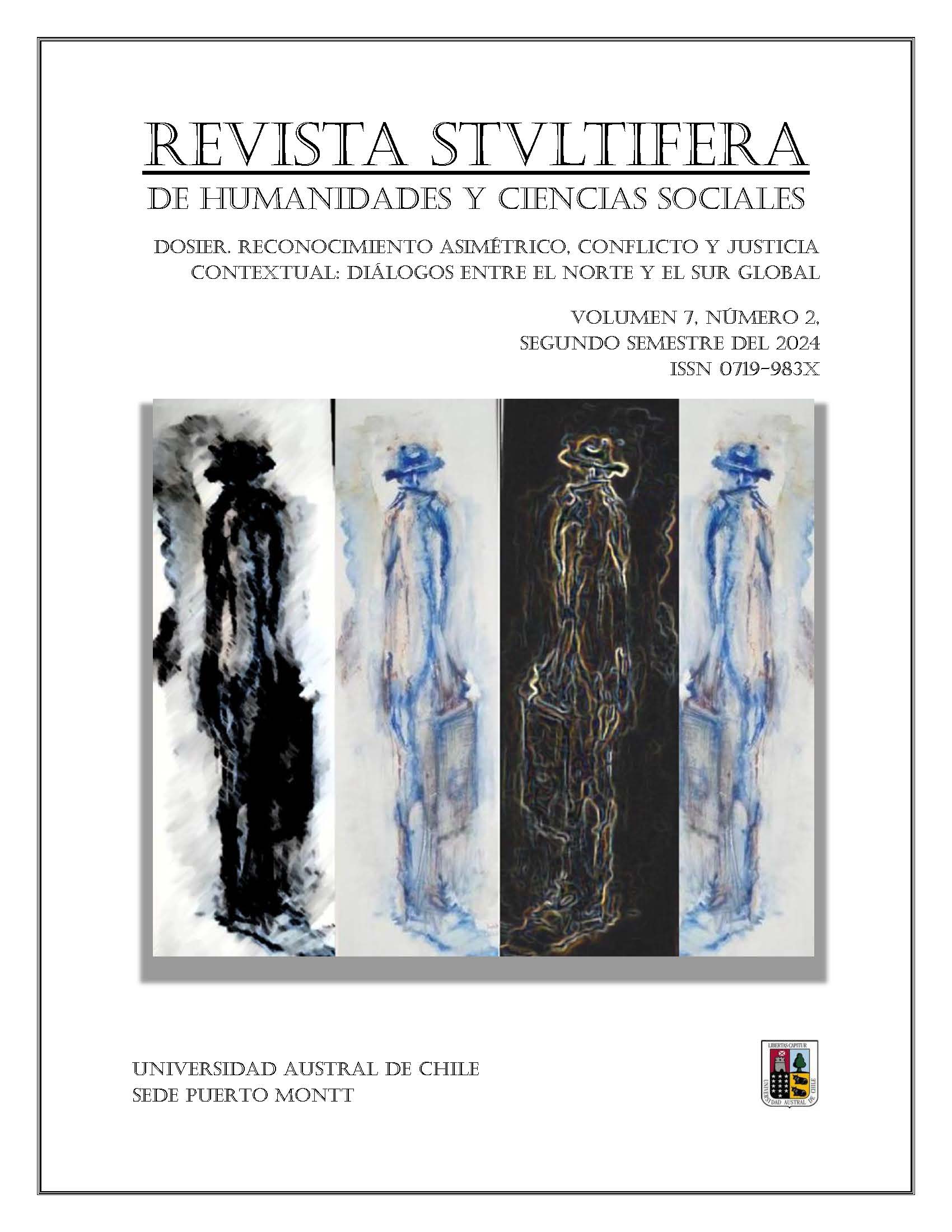Enrique Dussel and the Critical Recognition of the Other: Liberation and Interculturality
Main Article Content
Abstract
This paper seeks to demonstrate how the critique of the Hegelian idea of recognition plays a central role in Enrique Dussel’s Philosophy of Liberation. It begins by showing how Dussel encountered the richness and limits of Levinasian thought on recognition. Following in Levinas’s footsteps, Dussel shows the ethical and political fecundity of an asymmetrical, non-reciprocal recognition of radical alterity. This specific recognition is the true engine of the analectic method proper to the Philosophy of Liberation. Recalling the main points of his debate with Axel Honneth, the article then shows that the Ethics and Politics of Liberation both give priority to a recognition at once material, formal and feasible of the excluded and oppressed Others. This critical recognition is concretized in the political struggle for the dignity of the various social movements or liberation fronts both in the South and the North, and in the intercultural dialogue towards a pluriversal transmodernity.
Article Details

This work is licensed under a Creative Commons Attribution-NonCommercial 4.0 International License.
Usted es libre de compartir (copiar y redistribuir el material en cualquier medio o formato) y adaptar (remezclar, transformar y construir sobre el material). El licenciante no puede revocar estas libertades siempre y cuando usted siga los términos de la licencia.
La licencia se da bajo los siguientes términos:
Atribución: debe dar el crédito adecuado, proporcionar un enlace a la licencia e indicar si se realizaron cambios. Puede hacerlo de cualquier manera razonable, pero no de ninguna manera que sugiera que el licenciante lo respalda a usted o a su uso.
No comercial: no puede utilizar el material con fines comerciales.
Sin restricciones adicionales: no puede aplicar términos legales o medidas tecnológicas que restrinjan legalmente a otros de hacer cualquier cosa que la licencia permita.
References
Ajari, N. (2019). La dignité ou la mort. Éthique et politique de la race. La Découverte.
Balbontin Gallo, C. (2022). Honneth y el problema del poder: Potencia e impotencia de la teoría social. Hermenéutica Intercultural, 38, 171–197. https://doi.org/10.29344/07196504.38.3386.
Davies, P. (1995). On Resorting to an Ethical Language. En A. Peperzak (Ed.), Ethics as First Philosophy. The Significance of Emmanuel Levinas for Philosophy, Literature, and Religion (pp. 95-104). Routledge.
Dussel, E. (1974a). Método para filosofía liberación. Superación analéctica de la dialéctica hegeliana. Sígueme.
Dussel, E. (1974b). Interpretación latinoamericana de la filosofía imperial de Hegel, Latinoamérica, 2(5-6), 31-48.
Dussel, E. (2007). Materiales para una política de la liberación. UANL/Plaza y Valdés.
Dussel, E. (2008). 20 tesis de política. El perro y la rana.
Dussel, E. (2012). Obras selectas. En busca del sentido. Sobre el origen y el desarrollo de una Filosofía de la liberación. Docencia.
Dussel, E. (2015). Filosofías del sur. Descolonización y transmodernidad. Akal.
Dussel, E. (2016). Transmodernidad e interculturalidad (Interpretación desde la Filosofía de la Liberación). Astrágalo: Cultura de la Arquitectura y la Ciudad, 21, 31-54. https://doi.org/10.12795/astragalo.2016.i21.02.
Dussel, E. (2017). Analogía y comunicación (interpelación, diálogo intercultural hacia la transmodernidad). Cuadernos Filosóficos, 14, 66-101. https://doi.org/10.35305/cf2.vi14.31.
Fonti, D., y Guevara, F. (2020). Negación y reconocimiento. Condiciones de posibilidad del diálogo. Pléyade, 25, 81-106. http://dx.doi.org/10.4067/S0719-36962020000100081.
Holden, T. (2016). Honneth, Kojève and Levinas on intersubjectivity and history. Continental Philosophy Review, 49(3), 349-369.
https://doi.org/10.1007/s11007-015-9345-1.
Levinas, E. (1995). Totalidad e infinito. Sígueme.
Levinas, E. (2009a). Carnets de captivité. OEuvres complètes, vol. 1, IMEC/Grasset.
Levinas, E. (2009b). Parole et silence. OEuvres complètes, vol. 2, IMEC/Grasset.
Markell, P. (2003). Bound by Recognition. Princeton University Press. https://doi.org/10.1515/9781400825875.
McBride, C. (2013). Recognition. Polity Press.
McNay, L. (2008). Against Recognition. Polity Press.
McQueen, P. (2014). Subjectivity, Gender and the Struggle for Recognition. Palgrave Macmillan. https://doi.org/10.1057/9781137425997.
Oliver, K. (2011). Witnessing. Beyond Recognition, University of Minnesota Press.
Pöykkö, P.-M. (2016). Levinas and the Ambivalence of Recognition. Open Theology, 2(1), 636-652. https://doi.org/10.1515/opth-2016-0050.
Sohn, M. (2011). The Concept of Recognition In Levinas’s Thought. Philosophy Today, 55(3), 298-306. https://doi.org/10.5840/philtoday201155346.


 https://orcid.org/0009-0004-9292-889X
https://orcid.org/0009-0004-9292-889X